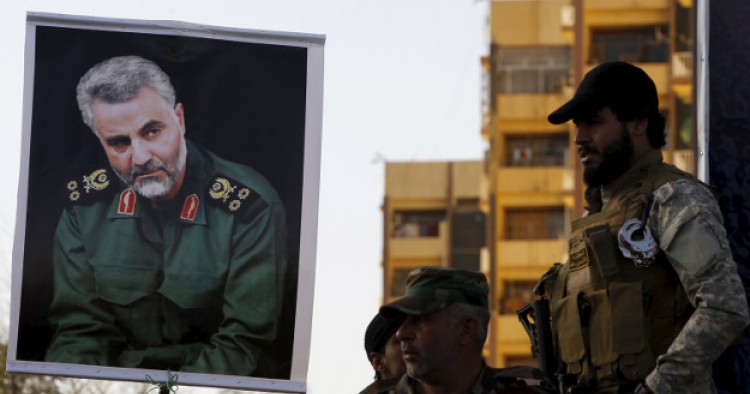Major General Qassem Soleimani, the head of the Islamic Revolution Guards Corps (I.R.G.C.)'s elite Quds Force, has traveled to the Iraqi Kurdish city of Sulaymaniyah as Kurdish political leaders are discussing plans to hold referendum on the political fate of the Iraqi Kurdistan region this year, Asharq al-Awsat reports. Quoting Iranian and Iraqi Kurdish officials, the paper said Soleimani arrived in Sulaymaniyah on Sunday to convince Iraqi Kurdish leaders not to hold the referendum. The Iranian general reportedly held meetings with leaders of the Patriotic Union of Kurdistan (P.U.K.), which is headed by Jalal Talabani, and urged them against reaching an agreement over the referendum with President Masoud Barzani, who is also the head of the Kurdistan Democratic Party (K.D.P.).
Hossein Yazdan-Panah, the deputy head the Iranian Kurdish Freedom Party, told Asharq al-Awsat that Soleimani stressed two issues in his meeting with P.U.K. leaders: “to hinder the referendum that will determine Kurdistan’s future” and “to create distance between the P.U.K. and the K.D.P.” as leaders of the two parties held a rare meeting recently to bridge their differences and work on Kurdistan’s political fate. He added that the Iranian government has long feared the rise of a U.S.-backed Kurdish state.
Comment: While much ink has been spilled about Soleimani’s role on the Iraqi and Syrian battlefields, the Quds Force commander’s growing influence over Iraqi politics has largely been overlooked. Since the U.S. military intervention toppled Saddam Hussain in 2003, Soleimani has propped up a powerful network of Shiite militia groups not only to fight Iran’s perceived enemies in Iraq – including the U.S. military and Iraqi Sunni groups – but he has also used that leverage to shape Iraq’s political affairs. All three Iranian ambassadors to post-Saddam Iraq have been Quds Force commanders – including Brigadier General Iraj Masjedi, Soleimani’s senior advisor recently appointed as Tehran's envoy to Baghdad.
The Kurdish leaders’ claim about Soleimani’s visit to Sulaymaniyah is difficult to confirm independently, and the Iranian media has not reported about the Quds Force commander’s alleged role in the Iraqi Kurdish affairs. But Tehran has made it clear recently that it opposes the Kurdish region’s bid for independence. Earlier this month, Iran’s Foreign Ministry criticized the hoisting of the Kurdistan Regional Government (K.R.G.) flags over government buildings in the Iraqi city of Kirkuk and warned that the move could exacerbate political tensions in the country.
And last month, a prominent Iran-backed Iraqi militia commander warned peshmerga forces loyal to the K.R.G. to withdraw from the northern Iraqi town of Sinjar and stressed that the Popular Mobilization Forces (P.M.F.) will not allow any parts of Nineveh Province to be incorporated into the Iraqi Kurdistan Region. “Popular Mobilization Forces will spare no effort to confront the expansionist agenda of Masoud Barzani, the head of Iraqi Kurdistan Region, in Nineveh Province and other Iraqi areas,” Jawad al-Talibawi, a spokesman for the armed wing of Asaib Ahl al-Haq, said in an exclusive interview with Iran’s Fars News Agency.
The Middle East Institute (MEI) is an independent, non-partisan, non-for-profit, educational organization. It does not engage in advocacy and its scholars’ opinions are their own. MEI welcomes financial donations, but retains sole editorial control over its work and its publications reflect only the authors’ views. For a listing of MEI donors, please click here.













